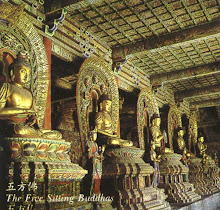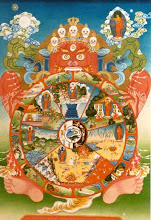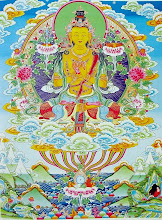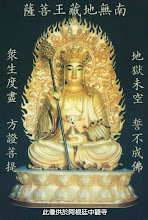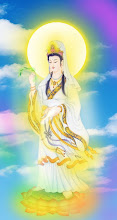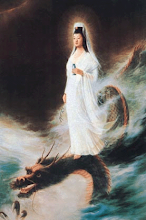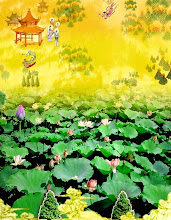(The full title is:)
Great, Upright and Broad Tathagata's Unimaginable State Sutra
Or
Maha-Vaipulya Tathagata's Unimaginable State Sutra
(Dai Forng Gworng Yiu Loy Bud See Yee Ging Gai Ging)
(Tripitaka No. 301)
Translated during the Tang Dynasty by Kustana Tripitaka Master Siksananda
Thus I have heard. At one time the Buddha achieved Samyak-Sambodhi (Correct Peerless Enlightenment) under the Bodhi-tree in Magadha state. The Bodhi-tree's name is Ahsipah, its root was deep in the soil, its trunk was tall, straight and had no knot, like a sandalwood column. Whenever birds approach, they had to fly back because they could not fly over the tree. The tree's skin was fine and glossy, with various interlaced colors, just like damasks. The tree was branchy and the crown of it was bushy and green.
Around the tree, there were many beautiful and lovely flowers blooming and emanating fragrance. They were much more beautiful than all other flowers except the Kovidars and Parijatas.
Around the tree, there were also many shorter trees. This Bodhi-tree, the king of trees, was splendid and handsome. It was like the Sumeru Mountain, which is the king of all mountains. It was so tall that even the people beyond 1 Yojana could see it. Its fragrance flows all around and its halo shines all around. People who saw it far away at night would suspect that it is a group of huge fires. The area under the tree was majestic, beautiful, spacious, and flat, like the happy garden, with luxuriant fragrant grass. It was like the neck of the peacock king, beautiful and fragrant, people do not tire of watching it.
At such a place, the Tathagata sat rightly and divinely, with many beings around him, just like a moon surrounded by stars.
At that time, coming from other directions, there were Buddhas as many as the atoms of ten Buddha-Worlds. In order to make the Bodhi-manda(site of enlightenment) of Vairocana more sublime, those Buddhas appeared as Bodhisattvas and joined the congregation. The names of their leaders are: Avalokitesvara(Contemplator of the World's Sounds) Bodhisattva, Manjusri Bodhisattva, Ksitigarbha(Earth Store) Bodhisattva, Akasagarbha(Space Store) Bodhisattva, Vajragarbha Bodhisattva, Vimalakirti Bodhisattva, Virtuous mighty light Bodhisattva, Extinguish all eclipses Bodhisattva, Ratna-Pani(Treasure Hand) Bodhisattva, Mahamati(Great Wisdom) Bodhisattva, Samantabhadra(Universal Goodness) Bodhisattva, and so on.
Moreover, hundred billions of Bodhisattvas appeared as Sravakas and came to join the congregation. The names of their leaders are: Shariputra, Maha-Maudgalyayana, Subhuti, Rahula, Ajnata-Kaundinya, Maha-Kasyapa, Upali, Aniruddha, Revata, Ananda, Devadatta, Upandanda, and so on. All of them had practiced the Six-Paramitas for a long time, and had already been very close to the Bodhi of Buddhas. In order to enlighten living beings, they appeared as Sravakas in this defiled world.
There were also innumerable Bhikshunis headed by Maha-Prajapati. All of them had already accomplished the meritorious virtues of great and wise men, in order to soothe the inferior living beings, they appeared as women.
There were also innumerable Sakra Devanam Indras, Brahmas, guardian gods, Devas, dragons, Yaksas, Gandharvas, Asuras, Garudas, Kinnaras, Mahoragas, human and nonhuman beings. They were all great Bodhisattvas, none of them was mundane person.
At that time, the Bhagavan(World Honored One), who was sitting under the Bodhi-tree, was sublime, pure, refined and wonderful, like the Wish-fulfilling pearl under the Citta tree. With the immovable Correct-Mindfulness, he was like the Sumeru Mountain. In order to make all Bodhisattvas and living beings understand the mighty and holy power of Buddhas' profound and secret Dhyana(Zen)s, he entered a Samadhi named Tathagata's Unimaginable State. Suddenly, each mark of the 32 marks of the Bhagavan revealed infinite Buddha-Worlds and Buddhas of the ten directions, just like a bright mirror reflecting various colors. Moreover, each mark of the 80 minor marks of the Bhagavan revealed his previous Bodhisattva-practices. From the Radiance king to the final incarnation at the place of Dipamkara(Burning Lamp) Buddha, all the difficult and arduous practices, the history that he completely donated all his heads, eyes, bodies, skins, fleshes, arms, legs, wives, servants, and the kingships, palaces, and so on.
This Samadhi has the great mighty power, all Buddhas are always in this Samadhi when they are eating, walking, teaching Dharmas, and even in Nirvana. Why? Because all Buddhas rely on this Samadhi to achieve boundless great mighty sacrosanct power, as far as to realize-and-prove(pravista) the vacuum nature of all dharmas, so they can manifest various unrestricted things at all Buddha-Worlds of the ten directions. For example, a person visualizes various fantastic things in his dream, but when he wakes up, all those things disappear. Likewise, for the mundane persons, because of the dreams of ignorance, they mistakenly think that all things are entities; meanwhile, all Buddhas are awakened and do not cling to anything, thus they can freely show infinite Buddha-Activities(Buddha-karya) within one infinitesimal thought, to profit all living beings and make them succeed, to help them comprehend innumerable abstruse and wonderful Liberation-Gates.
At that time, Virtue Store Bodhisattva, who had not yet achieved the perfection of Bodhi-Practices, asked Samantabhadra Bodhisattva: "What is the name of the Samadhi that the Tathagata entered into just now? How can he freely show various Buddha-Activities in all the worlds of the ten directions to rescue living beings?"
Then Samantabhadra Bodhisattva spoke to Virtue Store Bodhisattva: "Listen carefully and I'll tell you." At that time, all Bodhisattvas looked at them intently and reverently, and glorified together with one voice: "What an excellent question! How profound, delicate and wonderful! Arya(sage) Samantabhadra, who knows everything, is going to preach now." Instantly, the earth shook in six different ways, heaven rained down exquisite flowers, all living beings suffering from afflictions and distresses were relieved for a while.
Sunday, August 17, 2008
Tuesday, August 12, 2008
A Spiritual Goal For This Lifetime
by Professor Li Ping-Nan
Master Chin Kung’s Dharma Teacher
--------------------------------------------
Professor Li Ping-Nan was Master Chin Kung’s Dharma Teacher. Professor Lee’s Dharma teacher was Patriarch Yin Guang.
The following article was adapted from a small book by Professor Lee titled “A Buddhist Goal that Can Be Achieved in One’s Present Life”. In this book, Professor Lee describes some of the characteristics of the Pure Land and explains how Pure Land practitioners can use the technique of Buddha recitation to achieve rebirth there.
Two important sections of this article are titled “Morning and Evening Devotions” and “The Ten Recitation Method”. These two sections explain exactly how you can practice Buddha recitation every day, at home.
--------------------------------------------
Life is difficult most of the time.
Who can avoid sickness, aging and weakness, separation from loved ones, deaths of friends and family members, loss of wealth, and hate and mistreatment from others?
The poor seek wealth, the childless want to have children, the unemployed want to find work, and on and on.
How many of these wishes can come true? Is there any way to solve these unfortunate problems?
Life is full of calamities.
Many people die in hurricanes, earthquakes, floods, and fires. Many others starve due to drought or too much rain. Unexpected death is facing us every year. In a nuclear or biological war, the human race could be eliminated. Is there any way to avoid these disasters?
The revolving wheel of birth and death is painful.
And death is not the end. A living body can die, but its consciousness never dies. Upon the death of the body, consciousness leaves the body and goes to one of the six paths: heaven, the human world, the asura world, the animal world, the hungry ghost world, or hell. Heaven and the human world are the better places of these six, but the cycle of birth and death is unavoidable. Everybody has to go through the birth-and-death cycle on one of the six paths. Imagine how terrible it must be in the animal world, and how painful it must be in hell! The birth-and-death cycle through the six paths is known as the “six-path revolving wheel of Birth-and-Death”. Is there any way to escape this revolving wheel of Birth-and-Death and secure a peaceful, happy eternal life?
Overcoming Life’s Difficulties and Escaping From the Cycle of Birth and Death
Eliminate life’s difficulties and divert calamities.
Whether we have a fortunate life or an unfortunate life is determined by our own mind and our own behavior. It is a system of cause and effect.
Causes and effects involve three time periods: the past, the present, and the future. A difficult life and the occurrence of disasters are results of previous evil thoughts or bad behavior. But can divert and avoid unfortunate events by reciting Buddha’s name. The Sutras tell us that serious offenses and crimes committed aeons ago can be eliminated by sincerely reciting Buddha’s name.
The Sutras also say that there is a limitless number of Buddhas in the universe who protect those who recite, “Amitabha Buddha”. Buddha possesses infinite virtue, supreme wisdom, and boundless might. If you have Buddha’s blessing, no disaster can befall you.
Master Chin Kung’s Dharma Teacher
--------------------------------------------
Professor Li Ping-Nan was Master Chin Kung’s Dharma Teacher. Professor Lee’s Dharma teacher was Patriarch Yin Guang.
The following article was adapted from a small book by Professor Lee titled “A Buddhist Goal that Can Be Achieved in One’s Present Life”. In this book, Professor Lee describes some of the characteristics of the Pure Land and explains how Pure Land practitioners can use the technique of Buddha recitation to achieve rebirth there.
Two important sections of this article are titled “Morning and Evening Devotions” and “The Ten Recitation Method”. These two sections explain exactly how you can practice Buddha recitation every day, at home.
--------------------------------------------
Life is difficult most of the time.
Who can avoid sickness, aging and weakness, separation from loved ones, deaths of friends and family members, loss of wealth, and hate and mistreatment from others?
The poor seek wealth, the childless want to have children, the unemployed want to find work, and on and on.
How many of these wishes can come true? Is there any way to solve these unfortunate problems?
Life is full of calamities.
Many people die in hurricanes, earthquakes, floods, and fires. Many others starve due to drought or too much rain. Unexpected death is facing us every year. In a nuclear or biological war, the human race could be eliminated. Is there any way to avoid these disasters?
The revolving wheel of birth and death is painful.
And death is not the end. A living body can die, but its consciousness never dies. Upon the death of the body, consciousness leaves the body and goes to one of the six paths: heaven, the human world, the asura world, the animal world, the hungry ghost world, or hell. Heaven and the human world are the better places of these six, but the cycle of birth and death is unavoidable. Everybody has to go through the birth-and-death cycle on one of the six paths. Imagine how terrible it must be in the animal world, and how painful it must be in hell! The birth-and-death cycle through the six paths is known as the “six-path revolving wheel of Birth-and-Death”. Is there any way to escape this revolving wheel of Birth-and-Death and secure a peaceful, happy eternal life?
Overcoming Life’s Difficulties and Escaping From the Cycle of Birth and Death
Eliminate life’s difficulties and divert calamities.
Whether we have a fortunate life or an unfortunate life is determined by our own mind and our own behavior. It is a system of cause and effect.
Causes and effects involve three time periods: the past, the present, and the future. A difficult life and the occurrence of disasters are results of previous evil thoughts or bad behavior. But can divert and avoid unfortunate events by reciting Buddha’s name. The Sutras tell us that serious offenses and crimes committed aeons ago can be eliminated by sincerely reciting Buddha’s name.
The Sutras also say that there is a limitless number of Buddhas in the universe who protect those who recite, “Amitabha Buddha”. Buddha possesses infinite virtue, supreme wisdom, and boundless might. If you have Buddha’s blessing, no disaster can befall you.
Monday, August 11, 2008
Words of Wisdom - Venerable Master Chin Kung

1. Buddhism is an education, not a religion. We do not worship the Buddha, we respect him as a teacher. His teachings enable us to leave suffering and attain happiness.
2. "Buddha" means enlightenment /understanding. Complete understanding is when one realizes the truth about life and the universe. It is when one is apart from all delusions.
3. Cultivation is not something unusual, it is part of our everyday life. Whenever we recognize and correct our faults, we are cultivating.
4. To keep our mind pure and at peace is like keeping a pond clean and undisturbed. When the water is clear and still, it can reflect the sky, sun and trees just as they are, without distortion. When we are polluted by greed, hatred, ignorance and disturbed by discriminations and attachments, we distort our picture of reality and fail to see things as they are. Wrong perceptions of reality can prevent us from enjoying a clear and happy life.
5. What is purity? Purity is apart from defilement. Defilement is the greed, hatred, and stupidity present in our minds. Cultivation is cleansing these impurities from out hearts.
6. The Buddha's teachings should be introduced as an education, not a religion. Using spiritual penetrations and psychic abilities to attract people to believe in Buddhism is not the proper teachings and only serve to mislead others.
7. We should not be afraid to see our faults and mistakes because only then can be corrected. People who fail to see their own mistakes will not be able to change for the better.
8. A student of the Buddha does not just read Buddhist text, he/she studies them to reach a deeper understanding of life and the universe and puts the teachings into practice in everyday life.
9. In putting the teachings into practice, the first thing we should cultivate is the Pure Heart. The Pure Heart is a mind without discrimination or attachments. We must also develop proper understanding by listening to explanations of the Buddha's Teachings.
10. We should treat all people with respect and sincerity. We must be responsible for our actions and careful when handling other's properties. Be conservative with speech and actions to avoid harming others.
The Welfare of the Senior Citizens – A Concept for the Establishment of Garden Villas for the Elderly
Speech by Venerable Master Chin Kung
July 2007
----------------------------------
I left Taiwan in the 1970s, and have been traveling to various countries and regions to teach Buddhist principles based on what is taught in the Sutras. In each place I visited, I was most concerned with two things: First, the welfare of the elderly; and secondly, the rate of juvenile delinquency.
Why am I so concerned about the welfare of the elderly? The average age of the population is increasing and it is a world problem. How to take care of the livelihood of the senior citizens in a country is a major concern of most governments. To rear our children in the hope that they will look after us is wishful thinking and is not practical. Most of the members of our younger generation either failed to extend filial piety to their own parents or they lack the ability to take care of them. The home for the elderly seems to be the only solution in this situation.
When we examine the social structure of society in different countries, facilities for the elderly are hard to find. It is true that such facilities are found in some countries like the USA and Australia, especially in Australia. The Government there does look after their senior citizens. Yet, whether it was facilities provided by the Government or by private entities, the focus is on materialistic support and not support for their spiritual aspirations. The personnel involved look after the inmates like what is expected from mechanical devices. True love and compassion are seldom shown. The elderly would soon feel depressed, and abandoned. They live in solitude and would simply wait for their demise.
In such circumstances, we recently learnt from the Flower Adornment Sutra (also known as Avatamsaka Sutra). “The Four Immeasurable Compassions” concept has given us the inspiration that we have a duty to look after the aged. It is hoped that we should pull our resources together to help our senior citizens. Our senior citizens have made tremendous contribution to the society during their live time. They should have the opportunity to enjoy life in their final years. This is a way to build a selfless cordial society.
A few points for consideration:
1. Facilities and services similar to what is found in 5-star hotels should be made available. The accommodation provided should be comfortable in scenic areas. Single rooms complete with maid service should be made available. We could consider a fund raising exercise for donation or investment on a per room basis. Rooms not in use could be leased out. These could be made available to the guests of the inmates, or students who may need to make use of such facilities for study during their vacation.
July 2007
----------------------------------
I left Taiwan in the 1970s, and have been traveling to various countries and regions to teach Buddhist principles based on what is taught in the Sutras. In each place I visited, I was most concerned with two things: First, the welfare of the elderly; and secondly, the rate of juvenile delinquency.
Why am I so concerned about the welfare of the elderly? The average age of the population is increasing and it is a world problem. How to take care of the livelihood of the senior citizens in a country is a major concern of most governments. To rear our children in the hope that they will look after us is wishful thinking and is not practical. Most of the members of our younger generation either failed to extend filial piety to their own parents or they lack the ability to take care of them. The home for the elderly seems to be the only solution in this situation.
When we examine the social structure of society in different countries, facilities for the elderly are hard to find. It is true that such facilities are found in some countries like the USA and Australia, especially in Australia. The Government there does look after their senior citizens. Yet, whether it was facilities provided by the Government or by private entities, the focus is on materialistic support and not support for their spiritual aspirations. The personnel involved look after the inmates like what is expected from mechanical devices. True love and compassion are seldom shown. The elderly would soon feel depressed, and abandoned. They live in solitude and would simply wait for their demise.
In such circumstances, we recently learnt from the Flower Adornment Sutra (also known as Avatamsaka Sutra). “The Four Immeasurable Compassions” concept has given us the inspiration that we have a duty to look after the aged. It is hoped that we should pull our resources together to help our senior citizens. Our senior citizens have made tremendous contribution to the society during their live time. They should have the opportunity to enjoy life in their final years. This is a way to build a selfless cordial society.
A few points for consideration:
1. Facilities and services similar to what is found in 5-star hotels should be made available. The accommodation provided should be comfortable in scenic areas. Single rooms complete with maid service should be made available. We could consider a fund raising exercise for donation or investment on a per room basis. Rooms not in use could be leased out. These could be made available to the guests of the inmates, or students who may need to make use of such facilities for study during their vacation.
Saturday, August 9, 2008
The Sutra in Forty-two Sections Spoken by the Buddha (Section 38 to 42)
Lectures by the Venerable Master Hsuan Hua,
Given at Gold Mountain Monastery,
San Francisco, California, in 1974
The Sutra in Forty-two Sections Spoken by the Buddha
Section 38 to 42
-----------------------------------------------------------------------
Section 38
Birth Leads to Death
The Buddha asked a Shramana, how long is the human life span? "He replied, few days. "The Buddha said, you have not yet understood the Way."
He asked another Shramana, how long is the human life span? "The reply was, the space of a meal. "The Buddha said, you have not yet understood the Way."
He asked another Shramana, how long is the human life span? "He replied, the length of a single breath. "The Buddha said, excellent. You have understood the Way."
The Buddha asked a Shramana, how long is the human life span? "The Buddha asked this question deliberately. It wasn’t that the Buddha didn’t know the answer himself and had to ask the Shramana to find out. The Buddha asked because he knew that people don’t know the length of the human life span. So he asked a Shramana, how long is a human being life? How much time does a human life last? " He replied, few days. "The first Shramana said, probably after a few days we will die. Life is not very long. " The Buddha said, you have not yet understood the Way. You still don understand. "
He asked another Shramana, how long is the human life span? "The reply was, he space of a meal. "The Shramana answered, n the time it takes to eat a single meal, a person life is over. " The Buddha said, you have not yet understood the Way. "He, too, didn understand.
He asked another Shramana, how long is the human life span? "He replied, he length of a single breath. The life span of a human being lasts for one breath. "The Buddha said, excellent. You have understood the Way." The Shramana who gave this answer understood the Way.
In India there was once a king who believed in adherents of non-Buddhist religions that cultivated many kinds of ascetic practices. Some followed the precepts of cows and some the precepts of dogs; some smeared ashes on their bodies; and some slept on beds of nails. They cultivated all sorts of ascetic practices, such as those undertaken by yogis. Meanwhile, the Bhikshus who cultivated the Buddhadharma had it comparatively easy, because they didn cultivate those kinds of ascetic practices. Now, the king of that country said to the Buddha disciples, believe that although these non-Buddhists cultivate all kinds of ascetic practices, they still cannot stop their thoughts of sexual desire. How much less are you Bhikshus, who are so casual, able to stop your afflictions and your thoughts of sexual desire. You surely cannot put a stop to them. "
One of the Dharma Masters answered the king this way, take a man from jail who has been sentenced to execution and say to him, take this bowl of oil and carry it in your hands as you walk down the street. If you spill a single drop of the oil, I’ll have you executed. If you don’t spill a single drop, I’ll release you when you return. ' Then, send some beautiful women musicians out on the street to sing and play their instruments where the sentenced man is walking with his bowl of oil. If he should spill any oil, of course you’ll execute him. If he comes back without spilling a single drop, ask him what he seen on the road, and see what he says! "
Given at Gold Mountain Monastery,
San Francisco, California, in 1974
The Sutra in Forty-two Sections Spoken by the Buddha
Section 38 to 42
-----------------------------------------------------------------------
Section 38
Birth Leads to Death
The Buddha asked a Shramana, how long is the human life span? "He replied, few days. "The Buddha said, you have not yet understood the Way."
He asked another Shramana, how long is the human life span? "The reply was, the space of a meal. "The Buddha said, you have not yet understood the Way."
He asked another Shramana, how long is the human life span? "He replied, the length of a single breath. "The Buddha said, excellent. You have understood the Way."
The Buddha asked a Shramana, how long is the human life span? "The Buddha asked this question deliberately. It wasn’t that the Buddha didn’t know the answer himself and had to ask the Shramana to find out. The Buddha asked because he knew that people don’t know the length of the human life span. So he asked a Shramana, how long is a human being life? How much time does a human life last? " He replied, few days. "The first Shramana said, probably after a few days we will die. Life is not very long. " The Buddha said, you have not yet understood the Way. You still don understand. "
He asked another Shramana, how long is the human life span? "The reply was, he space of a meal. "The Shramana answered, n the time it takes to eat a single meal, a person life is over. " The Buddha said, you have not yet understood the Way. "He, too, didn understand.
He asked another Shramana, how long is the human life span? "He replied, he length of a single breath. The life span of a human being lasts for one breath. "The Buddha said, excellent. You have understood the Way." The Shramana who gave this answer understood the Way.
In India there was once a king who believed in adherents of non-Buddhist religions that cultivated many kinds of ascetic practices. Some followed the precepts of cows and some the precepts of dogs; some smeared ashes on their bodies; and some slept on beds of nails. They cultivated all sorts of ascetic practices, such as those undertaken by yogis. Meanwhile, the Bhikshus who cultivated the Buddhadharma had it comparatively easy, because they didn cultivate those kinds of ascetic practices. Now, the king of that country said to the Buddha disciples, believe that although these non-Buddhists cultivate all kinds of ascetic practices, they still cannot stop their thoughts of sexual desire. How much less are you Bhikshus, who are so casual, able to stop your afflictions and your thoughts of sexual desire. You surely cannot put a stop to them. "
One of the Dharma Masters answered the king this way, take a man from jail who has been sentenced to execution and say to him, take this bowl of oil and carry it in your hands as you walk down the street. If you spill a single drop of the oil, I’ll have you executed. If you don’t spill a single drop, I’ll release you when you return. ' Then, send some beautiful women musicians out on the street to sing and play their instruments where the sentenced man is walking with his bowl of oil. If he should spill any oil, of course you’ll execute him. If he comes back without spilling a single drop, ask him what he seen on the road, and see what he says! "
Thursday, August 7, 2008
The Sutra in Forty-two Sections Spoken by the Buddha (Section 36 to 37)
Lectures by the Venerable Master Hsuan Hua,
Given at Gold Mountain Monastery,
San Francisco, California, in 1974
The Sutra in Forty-two Sections Spoken by the Buddha
Section 36 to 37
--------------------------------------------------------------------------
Section 36
The Sequence that Leads to Success
The Buddha said, it is difficult for one to leave the evil destinies and become a human being.
Even if one does become a human being, it is still difficult to become a man rather than a woman.
Even if one does become a man, it is still difficult to have the six sense organs complete and perfect.
Even if the six sense organs are complete and perfect, it is still difficult for one to be born in a central country.
Even if one is born in a central country, it is still difficult to be born at a time when there is a Buddha in the world.
Even if one is born at a time when there is a Buddha in the world, it is still difficult to encounter the Way.
Even if one does encounter the Way, it is still difficult to bring forth faith.
Even if one brings forth faith, it is still difficult to resolve one mind on Bodhi.
Even if one does resolve one mind on Bodhi, it is still difficult to be beyond cultivation and attainment."
The thirty-sixth section discusses the difficulties of obtaining a human body, being born in a central country, meeting a Good and Wise Advisor, encountering a Buddha in the world, and various other difficulties.
The Buddha said, t is difficult for one to leave the evil destinies and become a human being. "The three evil destinies are the hells, the realm of hungry ghosts, and the realm of animals. It's very difficult to leave the three evil destinies and be reborn as a human being. When the Buddha was in the world, he once brought up a question for all the disciples to consider. The Buddha scooped up a handful of dirt and asked, all of you tell me, is there more dirt in my hand or on the whole earth? "
The Buddha disciples all answered, f course the dirt in the Buddha hand is less than the dirt on the whole earth! " Was there any need to ask about something as obvious as that?
The Buddha said, living beings who can leave the three evil destinies the hells, the realm of hungry ghosts, and the realm of animals and become humans are like the dirt in my hand. Those who remain in the three evil destinies and cannot obtain human bodies are like the dirt on the whole earth. " This shows that for beings to leave behind the evil destinies and become human is not easy. Thus it is said that becoming a human being is difficult.
Given at Gold Mountain Monastery,
San Francisco, California, in 1974
The Sutra in Forty-two Sections Spoken by the Buddha
Section 36 to 37
--------------------------------------------------------------------------
Section 36
The Sequence that Leads to Success
The Buddha said, it is difficult for one to leave the evil destinies and become a human being.
Even if one does become a human being, it is still difficult to become a man rather than a woman.
Even if one does become a man, it is still difficult to have the six sense organs complete and perfect.
Even if the six sense organs are complete and perfect, it is still difficult for one to be born in a central country.
Even if one is born in a central country, it is still difficult to be born at a time when there is a Buddha in the world.
Even if one is born at a time when there is a Buddha in the world, it is still difficult to encounter the Way.
Even if one does encounter the Way, it is still difficult to bring forth faith.
Even if one brings forth faith, it is still difficult to resolve one mind on Bodhi.
Even if one does resolve one mind on Bodhi, it is still difficult to be beyond cultivation and attainment."
The thirty-sixth section discusses the difficulties of obtaining a human body, being born in a central country, meeting a Good and Wise Advisor, encountering a Buddha in the world, and various other difficulties.
The Buddha said, t is difficult for one to leave the evil destinies and become a human being. "The three evil destinies are the hells, the realm of hungry ghosts, and the realm of animals. It's very difficult to leave the three evil destinies and be reborn as a human being. When the Buddha was in the world, he once brought up a question for all the disciples to consider. The Buddha scooped up a handful of dirt and asked, all of you tell me, is there more dirt in my hand or on the whole earth? "
The Buddha disciples all answered, f course the dirt in the Buddha hand is less than the dirt on the whole earth! " Was there any need to ask about something as obvious as that?
The Buddha said, living beings who can leave the three evil destinies the hells, the realm of hungry ghosts, and the realm of animals and become humans are like the dirt in my hand. Those who remain in the three evil destinies and cannot obtain human bodies are like the dirt on the whole earth. " This shows that for beings to leave behind the evil destinies and become human is not easy. Thus it is said that becoming a human being is difficult.
Wednesday, August 6, 2008
The Sutra in Forty-two Sections Spoken by the Buddha (Section 31 to 35)
Lectures by the Venerable Master Hsuan Hua,
Given at Gold Mountain Monastery,
San Francisco, California, in 1974
The Sutra in Forty-two Sections Spoken by the Buddha
Section 31 to 35
--------------------------------------------------------------------
Section 31
When the Mind Is Still, Desire Is Dispelled
The Buddha said, there was once someone who was plagued by ceaseless sexual desire and wished to castrate himself. The Buddha said to him, to cut off your sexual organ would not be as good as to cut off your mind. Your mind is like a supervisor: if the supervisor stops, his employees will also quit. If the deviant mind is not stopped, what good does it do to cut off the organ? '"
The Buddha spoke a verse for him:
Desire is born from your intentions.
Intentions are born from thoughts.
When both aspects of the mind are still,
There is neither form nor activity.
The Buddha said, this verse was spoken by the Buddha Kashyapa. "
The thirty-first section explains that when people want to stop desire, they should stop it within the mind. If you want to know the method for stopping the mind, you should realize that desire arises from the mind intentions and that your intentions are produced from your thoughts.
Now, take a look at your thoughts. Are they produced of them-selves? Are they produced from something else? Are they produced from a combination of both? Or are they produced without any cause? You should also find out whether thoughts are internal, external, or in the middle between the internal and external. Do they come from the past, the present, or from the future?
When you try to find thoughts in this way, your thoughts also become still and without any substance of their own. Once your thoughts are still, your intentions also become still. Since your intentions are still, your desires also become still. When your desires are still, you will see all forms and dharmas as images in a mirror. Like reflections in a mirror, they are not real. You will see that all activities are like bubbles: they are also false. All Buddhas successively contemplate and transmit these expedient Dharma-doors that enable one to subdue the mind.
The Buddha said, here was once someone who was plagued by ceaseless sexual desire and wished to castrate himself. "This person couldn’t stop his thoughts of lust even for a moment. Because his sexual desire was so strong and overwhelming, he tried to do something about it. He finally thought of a method: he decided to cut off his own male organ.
The Buddha said to him, to cut off your sexual organ would not be as good as to cut off your mind. Your mind is like a supervisor: if the supervisor stops, his employees will also quit. " The Buddha said to him, you say you want to cut off your male organ. It would be better to cut off your false-thinking mind. Your mind is like a supervisor: if the supervisor stops, the people working under him will also stop. " If the deviant mind is not stopped, what good does it do to cut off the organ? You get involved in an activity only because your mind has false thoughts. If your mind didn’t have false thoughts in the first place, then it wouldn’t get any help from others, and this kind of activity would stop. But if your deviant mind of lust is not stopped, then what use would it be to cut off your organ? That would be absolutely useless.
Given at Gold Mountain Monastery,
San Francisco, California, in 1974
The Sutra in Forty-two Sections Spoken by the Buddha
Section 31 to 35
--------------------------------------------------------------------
Section 31
When the Mind Is Still, Desire Is Dispelled
The Buddha said, there was once someone who was plagued by ceaseless sexual desire and wished to castrate himself. The Buddha said to him, to cut off your sexual organ would not be as good as to cut off your mind. Your mind is like a supervisor: if the supervisor stops, his employees will also quit. If the deviant mind is not stopped, what good does it do to cut off the organ? '"
The Buddha spoke a verse for him:
Desire is born from your intentions.
Intentions are born from thoughts.
When both aspects of the mind are still,
There is neither form nor activity.
The Buddha said, this verse was spoken by the Buddha Kashyapa. "
The thirty-first section explains that when people want to stop desire, they should stop it within the mind. If you want to know the method for stopping the mind, you should realize that desire arises from the mind intentions and that your intentions are produced from your thoughts.
Now, take a look at your thoughts. Are they produced of them-selves? Are they produced from something else? Are they produced from a combination of both? Or are they produced without any cause? You should also find out whether thoughts are internal, external, or in the middle between the internal and external. Do they come from the past, the present, or from the future?
When you try to find thoughts in this way, your thoughts also become still and without any substance of their own. Once your thoughts are still, your intentions also become still. Since your intentions are still, your desires also become still. When your desires are still, you will see all forms and dharmas as images in a mirror. Like reflections in a mirror, they are not real. You will see that all activities are like bubbles: they are also false. All Buddhas successively contemplate and transmit these expedient Dharma-doors that enable one to subdue the mind.
The Buddha said, here was once someone who was plagued by ceaseless sexual desire and wished to castrate himself. "This person couldn’t stop his thoughts of lust even for a moment. Because his sexual desire was so strong and overwhelming, he tried to do something about it. He finally thought of a method: he decided to cut off his own male organ.
The Buddha said to him, to cut off your sexual organ would not be as good as to cut off your mind. Your mind is like a supervisor: if the supervisor stops, his employees will also quit. " The Buddha said to him, you say you want to cut off your male organ. It would be better to cut off your false-thinking mind. Your mind is like a supervisor: if the supervisor stops, the people working under him will also stop. " If the deviant mind is not stopped, what good does it do to cut off the organ? You get involved in an activity only because your mind has false thoughts. If your mind didn’t have false thoughts in the first place, then it wouldn’t get any help from others, and this kind of activity would stop. But if your deviant mind of lust is not stopped, then what use would it be to cut off your organ? That would be absolutely useless.
Tuesday, August 5, 2008
The Sutra in Forty-two Sections Spoken by the Buddha (Section 27 to 30)
Lectures by the Venerable Master Hsuan Hua,
Given at Gold Mountain Monastery,
San Francisco, California, in 1974
The Sutra in Forty-two Sections Spoken by the Buddha
Section 27 to 30
-----------------------------------------------------------------------
Section 27
One Attains the Way after Letting Go of Attachments
The Buddha said, person who follows the Way is like a floating piece of wood that courses along with the current. If it does not touch either shore; if people do not pluck it out; if ghosts and spirits do not intercept it; if it is not trapped in whirlpools; and if it does not rot, I guarantee that the piece of wood will reach the sea. If students of the Way are not deluded by emotion and desire, and if they are not caught up in the many crooked views, but are vigorous in their cultivation of the unconditioned, I guarantee that they will certainly attain the Way. "
The twenty-seventh section sets forth an analogy to explain that in cultivating the Way, one should stay clear of all kinds of obstacles. What are the two shores? The two shores refer to emotion and desire. Emotion and desire further divide into two kinds: (1) the emotion and desire of views and thought and (2) the emotion and desire of ignorance. With the first, you grow attached to birth and death, which is represented by this shore. With the second, you become attached to Nirvana, which is represented by the other shore. Wood that is plucked out by people is analogous to cultivators getting caught in the nets of crooked views. Wood that is intercepted by ghosts and spirits is analogous to cultivators who get covered by the nets of views and thoughts.
Being caught up in a whirlpool refers to being lazy, which is the opposite of being vigorous. Rotten wood represents the opposite of unconditioned dharmas. Some cultivators are not properly mindful of True Suchness in a straightforward manner, and although they often wish to be vigorous, they end up retreating. It is as if they were in a whirlpool: although the water flows fast, it merely circles in the same spot. Similarly, they return to where they started and cannot reach unconditioned dharmas. Since they cannot reach the unconditioned, they become attached to appearances and cannot perfect the cultivation of blessings and wisdom. People in this situation are likened to rotting wood. They are bound to sink, and they will not reach the other shore of Nirvana. They won be able to end birth and death. That the result of being confused by emotional desire and caught up in the myriad crooked bypaths of love and views. If one is properly mindful of True Suchness and vigorously cultivates, understands that the fundamental nature of the Dharma is originally unconditioned, and can withstand being turned by emotions and love, then one will certainly attain the Way. That is the general meaning of this section of the text.
Given at Gold Mountain Monastery,
San Francisco, California, in 1974
The Sutra in Forty-two Sections Spoken by the Buddha
Section 27 to 30
-----------------------------------------------------------------------
Section 27
One Attains the Way after Letting Go of Attachments
The Buddha said, person who follows the Way is like a floating piece of wood that courses along with the current. If it does not touch either shore; if people do not pluck it out; if ghosts and spirits do not intercept it; if it is not trapped in whirlpools; and if it does not rot, I guarantee that the piece of wood will reach the sea. If students of the Way are not deluded by emotion and desire, and if they are not caught up in the many crooked views, but are vigorous in their cultivation of the unconditioned, I guarantee that they will certainly attain the Way. "
The twenty-seventh section sets forth an analogy to explain that in cultivating the Way, one should stay clear of all kinds of obstacles. What are the two shores? The two shores refer to emotion and desire. Emotion and desire further divide into two kinds: (1) the emotion and desire of views and thought and (2) the emotion and desire of ignorance. With the first, you grow attached to birth and death, which is represented by this shore. With the second, you become attached to Nirvana, which is represented by the other shore. Wood that is plucked out by people is analogous to cultivators getting caught in the nets of crooked views. Wood that is intercepted by ghosts and spirits is analogous to cultivators who get covered by the nets of views and thoughts.
Being caught up in a whirlpool refers to being lazy, which is the opposite of being vigorous. Rotten wood represents the opposite of unconditioned dharmas. Some cultivators are not properly mindful of True Suchness in a straightforward manner, and although they often wish to be vigorous, they end up retreating. It is as if they were in a whirlpool: although the water flows fast, it merely circles in the same spot. Similarly, they return to where they started and cannot reach unconditioned dharmas. Since they cannot reach the unconditioned, they become attached to appearances and cannot perfect the cultivation of blessings and wisdom. People in this situation are likened to rotting wood. They are bound to sink, and they will not reach the other shore of Nirvana. They won be able to end birth and death. That the result of being confused by emotional desire and caught up in the myriad crooked bypaths of love and views. If one is properly mindful of True Suchness and vigorously cultivates, understands that the fundamental nature of the Dharma is originally unconditioned, and can withstand being turned by emotions and love, then one will certainly attain the Way. That is the general meaning of this section of the text.
Monday, August 4, 2008
The Sutra in Forty-two Sections Spoken by the Buddha (Section 17 to 26)
Lectures by the Venerable Master Hsuan Hua,
Given at Gold Mountain Monastery,
San Francisco, California, in 1974
The Sutra in Forty-two Sections Spoken by the Buddha
Section 17 to 26
--------------------------------------------------------------------
Section 17
When Light Arrives, Darkness Departs
The Buddha said, those who see the Way are like someone holding a torch who enters a dark room, dispelling the darkness so that only light remains. When you study the Way and see the truth, ignorance vanishes and light remains forever."
The seventeenth section reveals that darkness has no independent existence. Since it doesn’t have any independent existence, once it vanishes, it is gone for good. Once you see the Way, then all ignorance will vanish.
The Buddha said, those who see the Way are like someone holding a torch who enters a dark room, dispelling the darkness so that only light remains. A person who sees the Way is like someone who takes up a torch and goes into a dark room, immediately banishing the darkness so that only the light remains. The darkness is gone because he holds a torch. The torch represents our wisdom. This means that if we have wisdom, we can break through ignorance, which is represented by the dark room. If we have wisdom, the dark room will become bright.
When you study the Way and see the truth, ignorance vanishes and light remains forever. Someone who studies the Way and can see the actual truth will immediately vanquish ignorance, and wisdom will remain forever.
----------------------------------------------------------------------
Section 18
Thoughts and So Forth Are Basically Empty
The Buddha said, Dharma is the mindfulness that is both mindfulness and non-mindfulness. It is the practice that is both practice and non-practice. It is words that are words and non-words, and cultivation that is cultivation and non-cultivation. Those who understand are near to it; those who are confused are far away, indeed. It is not accessible by the path of language. It is not hindered by physical objects. If you are off by a hairsbreadth, you will lose it in an instant. "
The eighteenth section explains the relationship between the existence and non-existence of mindfulness and cultivation.
The Buddha said, Dharma is the mindfulness that is both mindfulness and non-mindfulness. "The Buddha said, Dharma is not being mindful that you are mindful; and even the thought of that not being mindful is not there. Therefore my Dharma is called a mindfulness that is mindfulness, and yet not mindfulness. It is the practice that is both practice and non-practice. In my Dharma, practice also is he Way of effortlessness. In cultivating, you don want to have any attachments. It should be the same as not cultivating. Even the shadow of o cultivating should not remain.”
It is words that are words and non-words. Don’t be attached to words and language. Further, even your intention not to be attached to words and language should be done away with. And it is cultivation that is cultivation and non-cultivation. It is the Way of effortlessness, cultivating and yet not cultivating, certifying and yet not certifying. There isn’t any thought of cultivating the Way. That means that you don have any attachments; all attachments are seen as empty. Even the emptiness is emptied out.
Those who understand are near to it. To understand something means to be clear about it. If you understand this doctrine, you are near to the Way. Those who are confused are far away, indeed. But if you fail to understand and are confused about the principle, then you will be far from the Way. What is the Way ultimately like? It tell you: It is not accessible by the path of language. You want to speak about it, but you can represent it in words. You want to think about it, but you can formulate the thought. You simply cannot speak of its wonder. It is said that the path of words and language is cut off, and the place of the mind workings ceases to be. What the mind wants to think about is gone, and absolutely everything is empty. It is not hindered by physical objects. Physical matter is itself the basic substance of True Suchness. If you are able to realize this state, then you will see that the mountains, the rivers, the earth, and all the myriad things are just the basic substance of True Suchness, and you will not be hindered by physical objects. If you are off by a hairsbreadth, if you are off by just a fraction of an inch, just a tiny bit, in the way you cultivate, you will lose it in an instant. You immediately lose it and won be able to find it. You should break through your attachments, and then you will be able to attain this state.
Given at Gold Mountain Monastery,
San Francisco, California, in 1974
The Sutra in Forty-two Sections Spoken by the Buddha
Section 17 to 26
--------------------------------------------------------------------
Section 17
When Light Arrives, Darkness Departs
The Buddha said, those who see the Way are like someone holding a torch who enters a dark room, dispelling the darkness so that only light remains. When you study the Way and see the truth, ignorance vanishes and light remains forever."
The seventeenth section reveals that darkness has no independent existence. Since it doesn’t have any independent existence, once it vanishes, it is gone for good. Once you see the Way, then all ignorance will vanish.
The Buddha said, those who see the Way are like someone holding a torch who enters a dark room, dispelling the darkness so that only light remains. A person who sees the Way is like someone who takes up a torch and goes into a dark room, immediately banishing the darkness so that only the light remains. The darkness is gone because he holds a torch. The torch represents our wisdom. This means that if we have wisdom, we can break through ignorance, which is represented by the dark room. If we have wisdom, the dark room will become bright.
When you study the Way and see the truth, ignorance vanishes and light remains forever. Someone who studies the Way and can see the actual truth will immediately vanquish ignorance, and wisdom will remain forever.
----------------------------------------------------------------------
Section 18
Thoughts and So Forth Are Basically Empty
The Buddha said, Dharma is the mindfulness that is both mindfulness and non-mindfulness. It is the practice that is both practice and non-practice. It is words that are words and non-words, and cultivation that is cultivation and non-cultivation. Those who understand are near to it; those who are confused are far away, indeed. It is not accessible by the path of language. It is not hindered by physical objects. If you are off by a hairsbreadth, you will lose it in an instant. "
The eighteenth section explains the relationship between the existence and non-existence of mindfulness and cultivation.
The Buddha said, Dharma is the mindfulness that is both mindfulness and non-mindfulness. "The Buddha said, Dharma is not being mindful that you are mindful; and even the thought of that not being mindful is not there. Therefore my Dharma is called a mindfulness that is mindfulness, and yet not mindfulness. It is the practice that is both practice and non-practice. In my Dharma, practice also is he Way of effortlessness. In cultivating, you don want to have any attachments. It should be the same as not cultivating. Even the shadow of o cultivating should not remain.”
It is words that are words and non-words. Don’t be attached to words and language. Further, even your intention not to be attached to words and language should be done away with. And it is cultivation that is cultivation and non-cultivation. It is the Way of effortlessness, cultivating and yet not cultivating, certifying and yet not certifying. There isn’t any thought of cultivating the Way. That means that you don have any attachments; all attachments are seen as empty. Even the emptiness is emptied out.
Those who understand are near to it. To understand something means to be clear about it. If you understand this doctrine, you are near to the Way. Those who are confused are far away, indeed. But if you fail to understand and are confused about the principle, then you will be far from the Way. What is the Way ultimately like? It tell you: It is not accessible by the path of language. You want to speak about it, but you can represent it in words. You want to think about it, but you can formulate the thought. You simply cannot speak of its wonder. It is said that the path of words and language is cut off, and the place of the mind workings ceases to be. What the mind wants to think about is gone, and absolutely everything is empty. It is not hindered by physical objects. Physical matter is itself the basic substance of True Suchness. If you are able to realize this state, then you will see that the mountains, the rivers, the earth, and all the myriad things are just the basic substance of True Suchness, and you will not be hindered by physical objects. If you are off by a hairsbreadth, if you are off by just a fraction of an inch, just a tiny bit, in the way you cultivate, you will lose it in an instant. You immediately lose it and won be able to find it. You should break through your attachments, and then you will be able to attain this state.
Sunday, August 3, 2008
The Sutra in Forty-two Sections Spoken by the Buddha (Section 13 to 16)
Lectures by the Venerable Master Hsuan Hua,
Given at Gold Mountain Monastery,
San Francisco, California, in 1974
The Sutra in Forty-two Sections Spoken by the Buddha
Section 13 to 16
-----------------------------------------------------------
Section 13
Questions about the Way and Past Lives
A Shramana asked the Buddha, what causes and conditions can I know my past lives and understand the ultimate Way? "
The Buddha said, purifying your mind and preserving your resolve, you can understand the ultimate Way. Just as when you polish a mirror, the dust vanishes and brightness remains, so too, if you cut off desire and do not seek, you then can know past lives. "
The thirteenth section helps people gain knowledge of past lives and an understanding of the Way. The Buddha tells us that if knowledge of past lives is our goal, we must understand the Way.
A Shramana asked, what causes and conditions can I know my past lives and understand the ultimate Way? "What causes and conditions, or what Dharma-doors, should I cultivate in order to obtain knowledge of past lives? How can I understand true principles? "
The Buddha said, purifying your mind and preserving your resolve, you can understand the ultimate Way. "The Buddha said, you should make your thoughts pure and guard your resolve. Firmly keep your resolve. Whatever vows you have made, you should uphold them. You can make vows and then forget them after only a few days. You can withdraw them after a short while. That not permissible. That not preserving your resolve. If you can purify your thoughts, if you can get rid of the darkness in your mind, the false thoughts, greed, hatred, and stupidity and if you can preserve your resolve, you will come naturally to understand the true Way, the highest Way." What is it like? Now I will give you an analogy.
Just as when you polish a mirror, the dust vanishes and bright-ness remains. It just like cleaning a mirror: when the dust is gone, the brightness of the mirror appears. This brightness refers to the penetration of past lives. So too, if you cut off desire and do not seek, you then can know past lives. If you can cut off your thoughts of desire and reach the level of not seeking for anything, then you can attain the penetration of knowing past lives. When people cultivate the Way, they certainly should not indulge in any scattered thinking or false thoughts. If you can do away with false and scattered thoughts, then no matter what Dharma-door you cultivate, you will quickly succeed with it. If you have false and scattered thoughts, as well as greed, hatred, and stupidity filling up your belly, then you certainly aren’t going to obtain a response, no matter what Dharma-door you cultivate. When we study and cultivate the Buddhadharma, we should first cut off desire and cast out love. You should sever thoughts of desire and reach the level of seeking nothing. If you seek for anything, just that seeking is suffering. No matter what you seek, if you cannot obtain it, you will experience the suffering of not getting what you want. Everyone should pay attention to this.
When we cultivate, what is it that we cultivate? We cultivate to get rid of false thoughts and thoughts of desire. That is real-skill. If you cleanse yourself of jealousy, obstructions, greed, hatred, and stupidity, then you can obtain the penetration of knowing past lives.
Given at Gold Mountain Monastery,
San Francisco, California, in 1974
The Sutra in Forty-two Sections Spoken by the Buddha
Section 13 to 16
-----------------------------------------------------------
Section 13
Questions about the Way and Past Lives
A Shramana asked the Buddha, what causes and conditions can I know my past lives and understand the ultimate Way? "
The Buddha said, purifying your mind and preserving your resolve, you can understand the ultimate Way. Just as when you polish a mirror, the dust vanishes and brightness remains, so too, if you cut off desire and do not seek, you then can know past lives. "
The thirteenth section helps people gain knowledge of past lives and an understanding of the Way. The Buddha tells us that if knowledge of past lives is our goal, we must understand the Way.
A Shramana asked, what causes and conditions can I know my past lives and understand the ultimate Way? "What causes and conditions, or what Dharma-doors, should I cultivate in order to obtain knowledge of past lives? How can I understand true principles? "
The Buddha said, purifying your mind and preserving your resolve, you can understand the ultimate Way. "The Buddha said, you should make your thoughts pure and guard your resolve. Firmly keep your resolve. Whatever vows you have made, you should uphold them. You can make vows and then forget them after only a few days. You can withdraw them after a short while. That not permissible. That not preserving your resolve. If you can purify your thoughts, if you can get rid of the darkness in your mind, the false thoughts, greed, hatred, and stupidity and if you can preserve your resolve, you will come naturally to understand the true Way, the highest Way." What is it like? Now I will give you an analogy.
Just as when you polish a mirror, the dust vanishes and bright-ness remains. It just like cleaning a mirror: when the dust is gone, the brightness of the mirror appears. This brightness refers to the penetration of past lives. So too, if you cut off desire and do not seek, you then can know past lives. If you can cut off your thoughts of desire and reach the level of not seeking for anything, then you can attain the penetration of knowing past lives. When people cultivate the Way, they certainly should not indulge in any scattered thinking or false thoughts. If you can do away with false and scattered thoughts, then no matter what Dharma-door you cultivate, you will quickly succeed with it. If you have false and scattered thoughts, as well as greed, hatred, and stupidity filling up your belly, then you certainly aren’t going to obtain a response, no matter what Dharma-door you cultivate. When we study and cultivate the Buddhadharma, we should first cut off desire and cast out love. You should sever thoughts of desire and reach the level of seeking nothing. If you seek for anything, just that seeking is suffering. No matter what you seek, if you cannot obtain it, you will experience the suffering of not getting what you want. Everyone should pay attention to this.
When we cultivate, what is it that we cultivate? We cultivate to get rid of false thoughts and thoughts of desire. That is real-skill. If you cleanse yourself of jealousy, obstructions, greed, hatred, and stupidity, then you can obtain the penetration of knowing past lives.
Saturday, August 2, 2008
The Sutra in Forty-two Sections Spoken by the Buddha (Section 11 to 12)
Lectures by the Venerable Master Hsuan Hua,
Given at Gold Mountain Monastery,
San Francisco, California, in 1974
The Sutra in Forty-two Sections Spoken by the Buddha
Section 11 to 12
--------------------------------------------------------------------------------
Section 11
The Increase in Merit Gained by Bestowing Food
The Buddha said, iving food to a hundred bad people is not as good as giving food to a single good person. Giving food to a thousand good people is not as good as giving food to one person who holds the Five Precepts. Giving food to ten thousand people who hold the Five Precepts is not as good as giving food to a single Srotaapanna.
Giving food to a million Srotaapannas is not as good as giving food to a single Sakridagamin. Giving food to ten million Sakri dagamins is not as good as giving food to a single Anagamin. Giving food to a hundred million Anaga mins is not as good as giving food to a single Arhat. Giving food to one billion Arhats is not as good as giving food to a single Pratyekabuddha. Giving food to ten billion Pratyekabuddhas is not as good as giving food to a Buddha of the three periods of time. Giving food to a hundred billion Buddhas of the three periods of time is not as good as giving food to a single person who is without thoughts, without dwelling, without cultivation, and without accomplishment."
The eleventh section of the Sutra compares the superior and inferior fields of blessings and lets people understand the superior and inferior aspects of making offerings.
The Buddha said, Giving food to a hundred bad people is not as good as giving food to a single good person. The previous section discussed giving in general terms, but when one gives, the important thing is to know how to do it. If you plant blessings but you don know the right method, if you don plant in accord with Dharma, then you won get any blessings. So the text says that giving food to one good person plants a greater field of blessings than giving to one hundred evil people. Why? Because after you feed a hundred bad people, all they can do are evil deeds. You become an accomplice to the bad things that they do, because you helped them do their evil deeds. If you give food to even one good person, then the good things he does after he eaten his fill are deeds that, you could say, you helped him accomplish. That is why it doesn equal giving food to a single good person.
Giving food to a thousand good people is not as good as giving food to one person who holds the Five Precepts. ood " here implies every kind of offering: food, drink, jewels, money, even your head, your eyes, your brains, and your marrow. If you give your life energy to help people do good things, then the good deeds they do are done with your help. But if you give your life energy in order to help bad people, you actually create offenses. Therefore the merit and virtue of feeding one thousand good people is not as great as that which accrues from giving to even one person who holds the Five Precepts.
Giving food to ten thousand people who hold the Five Precepts is not as good as giving food to a single Srotaapanna. eople who hold the Five Precepts " here refers to people who have taken refuge with the Triple Jewel, who hold the Five Precepts, and who cultivate the Ten Good Deeds. The merit and virtue of giving food to ten thousand people who hold the Five Precepts is not as great as that of making an offering of food to a single Srotaapanna, a sage of the first fruition.
Giving food to a million Srotaapannas is not as good as giving food to a single Sakridagamin. Giving food to a million Srotaapannas, sages of the first fruition, wouldn be as good as giving food to a sage of the second fruition, a Sakridagamin, because those of the first fruition do not know the state of those of the second fruition. Sages of the first fruition have already broken through delusion in views; those of the second fruition have also cut off six grades of delusion in thought in the desire realm. This was discussed in a previous section. Therefore, making an offering of food to a Sakridagamin of the second fruition has more merit and virtue than making an offering to a Srotaapanna of the first fruition.
Giving food to ten million Sakridagamins is not as good as giving food to a single Anagamin. Giving food to ten million sages of the second fruition, who have cut off six grades of delusion of thought in the desire realm, would not be as good as giving food to a single Anagamin, a sage of the third fruition. An Anagamin has cut off all nine grades of delusion of thought in the desire realm.
Given at Gold Mountain Monastery,
San Francisco, California, in 1974
The Sutra in Forty-two Sections Spoken by the Buddha
Section 11 to 12
--------------------------------------------------------------------------------
Section 11
The Increase in Merit Gained by Bestowing Food
The Buddha said, iving food to a hundred bad people is not as good as giving food to a single good person. Giving food to a thousand good people is not as good as giving food to one person who holds the Five Precepts. Giving food to ten thousand people who hold the Five Precepts is not as good as giving food to a single Srotaapanna.
Giving food to a million Srotaapannas is not as good as giving food to a single Sakridagamin. Giving food to ten million Sakri dagamins is not as good as giving food to a single Anagamin. Giving food to a hundred million Anaga mins is not as good as giving food to a single Arhat. Giving food to one billion Arhats is not as good as giving food to a single Pratyekabuddha. Giving food to ten billion Pratyekabuddhas is not as good as giving food to a Buddha of the three periods of time. Giving food to a hundred billion Buddhas of the three periods of time is not as good as giving food to a single person who is without thoughts, without dwelling, without cultivation, and without accomplishment."
The eleventh section of the Sutra compares the superior and inferior fields of blessings and lets people understand the superior and inferior aspects of making offerings.
The Buddha said, Giving food to a hundred bad people is not as good as giving food to a single good person. The previous section discussed giving in general terms, but when one gives, the important thing is to know how to do it. If you plant blessings but you don know the right method, if you don plant in accord with Dharma, then you won get any blessings. So the text says that giving food to one good person plants a greater field of blessings than giving to one hundred evil people. Why? Because after you feed a hundred bad people, all they can do are evil deeds. You become an accomplice to the bad things that they do, because you helped them do their evil deeds. If you give food to even one good person, then the good things he does after he eaten his fill are deeds that, you could say, you helped him accomplish. That is why it doesn equal giving food to a single good person.
Giving food to a thousand good people is not as good as giving food to one person who holds the Five Precepts. ood " here implies every kind of offering: food, drink, jewels, money, even your head, your eyes, your brains, and your marrow. If you give your life energy to help people do good things, then the good deeds they do are done with your help. But if you give your life energy in order to help bad people, you actually create offenses. Therefore the merit and virtue of feeding one thousand good people is not as great as that which accrues from giving to even one person who holds the Five Precepts.
Giving food to ten thousand people who hold the Five Precepts is not as good as giving food to a single Srotaapanna. eople who hold the Five Precepts " here refers to people who have taken refuge with the Triple Jewel, who hold the Five Precepts, and who cultivate the Ten Good Deeds. The merit and virtue of giving food to ten thousand people who hold the Five Precepts is not as great as that of making an offering of food to a single Srotaapanna, a sage of the first fruition.
Giving food to a million Srotaapannas is not as good as giving food to a single Sakridagamin. Giving food to a million Srotaapannas, sages of the first fruition, wouldn be as good as giving food to a sage of the second fruition, a Sakridagamin, because those of the first fruition do not know the state of those of the second fruition. Sages of the first fruition have already broken through delusion in views; those of the second fruition have also cut off six grades of delusion in thought in the desire realm. This was discussed in a previous section. Therefore, making an offering of food to a Sakridagamin of the second fruition has more merit and virtue than making an offering to a Srotaapanna of the first fruition.
Giving food to ten million Sakridagamins is not as good as giving food to a single Anagamin. Giving food to ten million sages of the second fruition, who have cut off six grades of delusion of thought in the desire realm, would not be as good as giving food to a single Anagamin, a sage of the third fruition. An Anagamin has cut off all nine grades of delusion of thought in the desire realm.
Labels:
Amitabha Buddha,
Arahat,
Bodhisattva,
Buddha,
Buddhism,
Buddhist,
Dharma,
five precepts,
Giving food,
Heaven,
Karma,
Monk,
Nirvana,
Pure Land,
Religious,
Sakyamuni Buddha,
Spiritual,
Sutra
Subscribe to:
Posts (Atom)



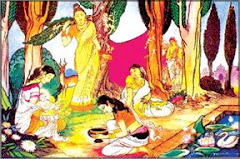
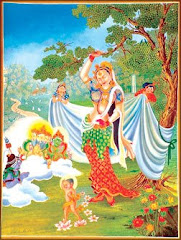
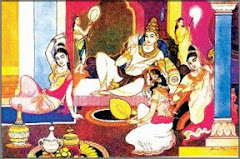

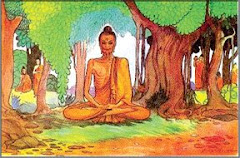



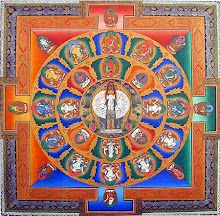
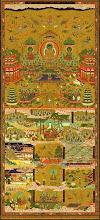
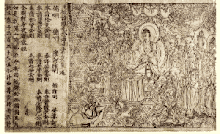
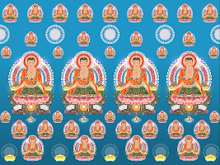

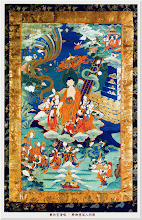

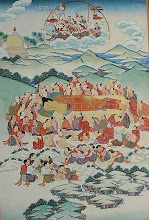


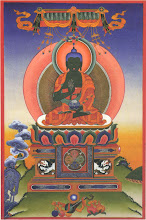




.jpg)

